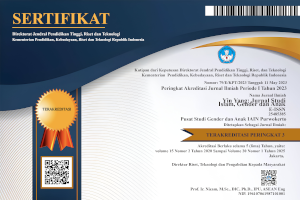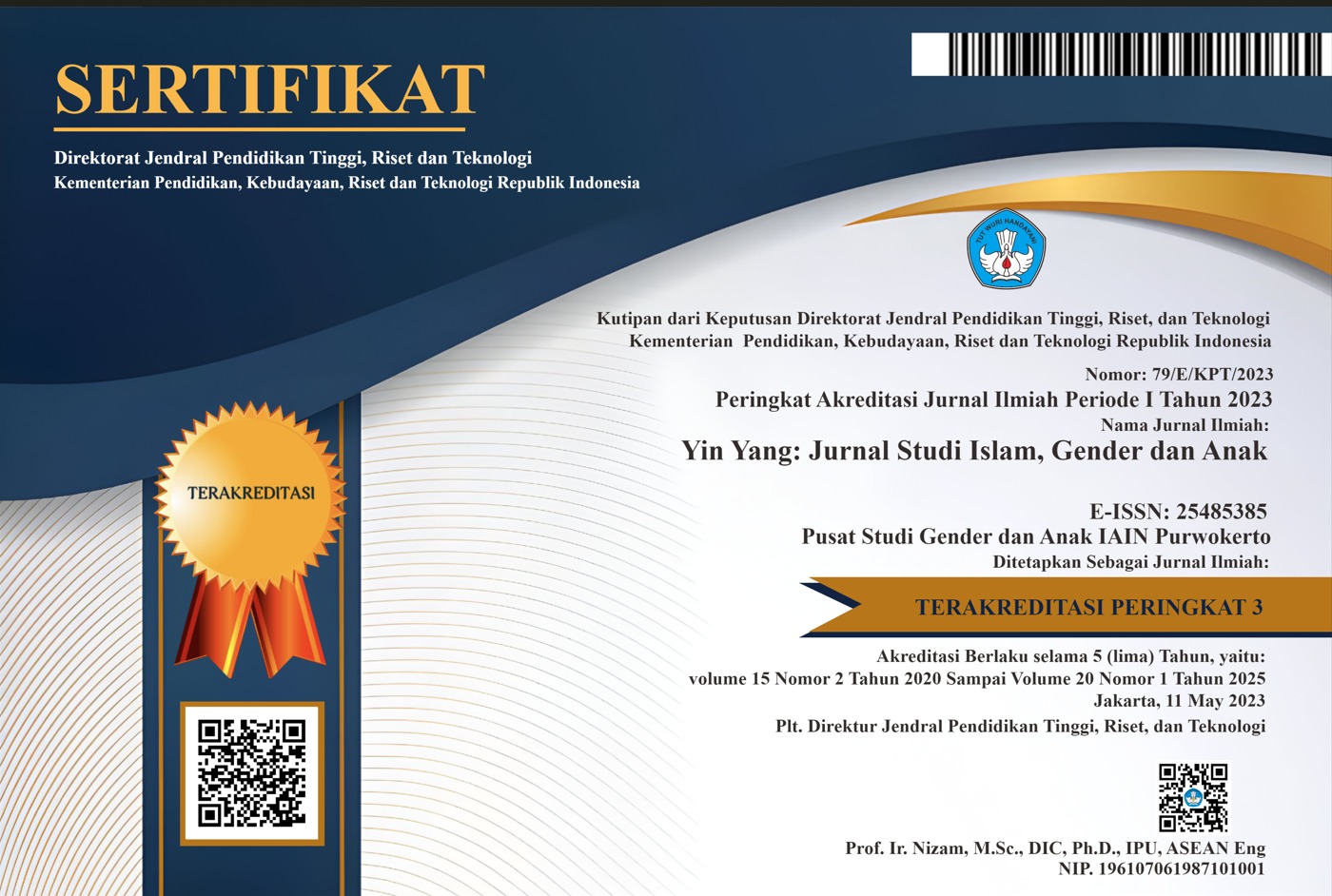The Role of Women in the Family as Mompreneur According to Islamic View
DOI:
https://doi.org/10.24090/yinyang.v17i1.5037Keywords:
The role of Women, Family, Mompreneur, Enterpreneur, Islamic ViewsAbstract
The role of women in the family plays an important and diverse role. Not just as a wife or a mother to her children. Women play the role of financial regulators in the family. With the role of financial regulator in the family, women in the era of digitalization are increasingly sensitive to the business world. Women are starting to have a lot of creativity to be entrepreneurial. This is done not only as a favorite but a variety of motivations as well as a large role as a regulator of economic sovereignty in the family. Entrepreneurial motivation in women includes motivation from within which includes the desire to be independent. Women in entrepreneurial families are called Mompreneurs. Mompreneur comes from the word mom and entrepreneur. The purpose of mompreneur is a mother who is a business or entrepreneurial but still does not abandon her role as a housewife. With his role, is it good according to islamic view? While the main task of women in the family is to educate children and accompany husbands and perform other domestic tasks,not as a breadwinner, from the study of literature on the view of Islam in emancipation. Emancipation that respects women's rights equals that of men. The role of women as mompreneur has positive values and is very beneficial to reduce the number of unemployed, support family welfare, mobilize self-reliance for other women in sociaty and contribute to the country and religion.Downloads
Download data is not yet available.
References
Abi Ya’la Muhamad Ibn Ahmad al-Husayn al-Farra’ al-Hambali, Al-Ahkam al-Sultthaiyah, (tt.: Dar-al-Tsaqafah al-Islamiyah, 1986).
Akbas, Dian. 2013. Muslimah Mompreneur: Isnpirasi Bisnis Perempuan Sepanjang Masa: Dari Khadijah hingga Perempuan Modern. Solo: Pustaka Arafah.
Al-Bukhary, Shahih Bukhary, juz 13, hlm. 337(Sumber Maktabah Syamilah).
Aminah, Mia Siti. 2010. Muslimah Career: Mencapai Karir Tertinggi di Hadapan Allah, Keluarga, dan Pekerjaan. Yogyakarta: Pustaka Ghratama.
Gilbert, Neil.2004. A Mother’s Work: How Feminism, the Market, and Policy Shape Family Life. London: Yale University Press.
Hanapi, A. (2015). Peran perempuan dalam islam. In Maret (Vol. 1, Issue 1). https://jurnal.ar-raniry.ac.id/index.php/equality/article/view/620
Harmain, U., Hartono, S., W, L. R., & H.D, D. (2014). Motivasi, persepsi dan Konflik Peran Pekerjaan-Keluarga Entreprenenur Perempuan daerah Istimewa Yogyakarta. XVI(1), 67–76.
Haunan, Ummu. 2015. Surgamu Ada di Rumahmu. Solo: Multazam.
Hermawati, Ade dkk., 2012. Hei, Ini Aku Ibu Profesional. Yogyakarta: Leutikaprio.
Humphreys, Macartan dkk. 2007. Escaping The Resource curse: Berkelit dari Sumber Daya Alam (Terjemahan). The Samdhana Institute Bogor.
Hunger, David. J. and Wheelen. Thomas L.,(2003), ManajemenStrategis, ANDI: Yogyakarta.
Munandar, A. S. (2001). Psikologi Industri dan Organisasi. Jakarta: UI.
Kardini, N. L. (n.d.). Peranan perempuan dalam meningkatkan pendapatan keluarga di desa pinggan kintamani. Ejournal.Unhi.Ac.Id. Retrieved March 27, 2021, from https://ejournal.unhi.ac.id/index.php/sewakabhaktipp.21-35Telp/Fax:
Krishna, S. M. (2013). Entrepreneurial Motivation A Case Study of Small Scale Entrepreneurs In Mekelle ,Ethiopia. 2(1), 1–6.
Koh, H.C., (1996),”Testing hypotheses of entrepreneurial characteristics”, Journal of Managerial
Psycology, Vol. 11.No. 3 pp.12-25.
M.Quraish Shihab, Perempuan, Jakarta: Lentera Hati, 2006, Cet. III.
Meredith. G.G. dkk. (1998), Kewirausahaan: Teori dan Praktek. Jakarta: Pustaka Binaman
Pressindo.
Muh. Zuhri, Hukum Islam dalam Lintasan Sejarah, ( Jakarta: RajaGrafindo Persada, 1996).
Muhammad Qutb, Subhat hawl al-Islam, terj. Salah Paham terhadap Islam, (IIFSO, 1985).
Rakhmat, Jalaluddin, 1986, .Islam Alternatif: Ceramah-Cermah di Kampus, Bandung: Mizan.
Rizal, M., Setianingsih, D., & Chandra, R. (2016). Faktor-faktor yang Mempengaruhi Wanita
Berwirausaha (Studi Kasus di Kota Langsa). Jurnal Manajemen Dan Keuangan Unsam,
5(2), 525–534.
Said Ramadhan, “Three Major Problems Confronting the World of Islam” dalam Ahmad Ibrahim et. Al. (ed.) Reading on Islam in Shoutheast Asia, (Singapore: Institute of South east Asian Studies, 1985)
Sangolagi, K., & Alagawadi, M. (2016). Women Entrepreneurs. International Small Business
Journal: Researching Entrepreneurship, 3(1),173–192. https://doi.org/10.1177/0266242608100489
Satya Wacana, Salatiga), Jurnal Manajemen dan Kewirausahaan, Vol.13, No. 2, September,
hal. 124-134.
Segal, G., Borgia, D., and Schoenfeld, J., (2005), The motivation to become an entrepreneur”,
International Journal of Entrepreneurial Behaviour & Research, Vo. 11 No. 1, pp.42-57.
Setiati, Eni. 2011. Super Mommy: Menjadi Ibu Istimewa, Buah Hati Luar Biasa. Jakarta: Buku Kita.
Suharti,Lieli dan Sirine, Hani,(2011), Faktor-faktor yang Berpengaruh Terhadap Niat
Kewirausahaan (Entrepreneurial Intention) (Studi Terhadap Mahasiswa Universitas Kristen
Sukidjo (2011), Membudayakan Kewirausahaan, WUNY Majalah Ilmiah Populer Tahun XII,
Nomor 1, Januari, Yogyakarta: Universitas Negeri Yogyakarta.
Shihab, M. Quraish, Wawasan Al-Qur’an: Tafsir Maudhu’i atas Pelbagai Persoalan Umat, Cet. III: Bandung: Mizan, 1996.
Syafiq Hasyim, Kepemimpinan Perempuan dalam Islam, ( Jakarta: JPPR, 1999)
Syahrin Harahap, Islam Dinamis Menegakkan Nilai-Nilai Ajaran Al-Qur’an dalam Kehidupan Modern di Indonesia, (Yogyakarta: Tiara wacana, 1997).
Ulya, F. N. (2019a). BPS: Pengangguran Meningkat, Lulusan SMK Mendominasi. Retrieved from
https://money.kompas.com/read/2019/11/05/155358926/bps-pengangguran-meningkat-lulusan-smk-mendominasi.
Wall, Karin. 2007. “Main Patterns in Attitudes to the Articulation Between Work and Family Life: a Cross-National Analysis”, dalam Women, Men, Work and Family in Europe. New York: Palgrave Macmillan.
Wibowo, D. E. (2011). Peran ganda perempuan dan kesetaraan gender. In e-journal.iainpekalongan.ac.id (Vol. 3, Issue 1). http://e-journal.iainpekalongan.ac.id/index.php/Muwazah/article/view/6/.
Zimmerer, W. T. and Scarborough, M. N., (1996), Essentials of Entrepreneurship and Small
Business Management.Prentice Hall: Third Edition.
Yimamu, N. (2018). Entrepreneurship and Entrepreneurial Motivation. Global Strategy, (April),
128–129. Retrieved from http://amzn.com/1133964613.
Yusuf Abdullah Daghfag, Thariq al-Hidayah, diterjemahkan menjadi Wanita Bersiaplah ke Rumah Tangga, ( Jakarta: Gema Insani Press, 1992.
Zimmerer, T. W., Scarborough, N. M., & Wilson, D. (2008) Kewirausahaan dan manajemen usaha
kecil (Buku 1, Edisi 5 terjemahan). Jakarta: Salemba Empat.
Akbas, Dian. 2013. Muslimah Mompreneur: Isnpirasi Bisnis Perempuan Sepanjang Masa: Dari Khadijah hingga Perempuan Modern. Solo: Pustaka Arafah.
Al-Bukhary, Shahih Bukhary, juz 13, hlm. 337(Sumber Maktabah Syamilah).
Aminah, Mia Siti. 2010. Muslimah Career: Mencapai Karir Tertinggi di Hadapan Allah, Keluarga, dan Pekerjaan. Yogyakarta: Pustaka Ghratama.
Gilbert, Neil.2004. A Mother’s Work: How Feminism, the Market, and Policy Shape Family Life. London: Yale University Press.
Hanapi, A. (2015). Peran perempuan dalam islam. In Maret (Vol. 1, Issue 1). https://jurnal.ar-raniry.ac.id/index.php/equality/article/view/620
Harmain, U., Hartono, S., W, L. R., & H.D, D. (2014). Motivasi, persepsi dan Konflik Peran Pekerjaan-Keluarga Entreprenenur Perempuan daerah Istimewa Yogyakarta. XVI(1), 67–76.
Haunan, Ummu. 2015. Surgamu Ada di Rumahmu. Solo: Multazam.
Hermawati, Ade dkk., 2012. Hei, Ini Aku Ibu Profesional. Yogyakarta: Leutikaprio.
Humphreys, Macartan dkk. 2007. Escaping The Resource curse: Berkelit dari Sumber Daya Alam (Terjemahan). The Samdhana Institute Bogor.
Hunger, David. J. and Wheelen. Thomas L.,(2003), ManajemenStrategis, ANDI: Yogyakarta.
Munandar, A. S. (2001). Psikologi Industri dan Organisasi. Jakarta: UI.
Kardini, N. L. (n.d.). Peranan perempuan dalam meningkatkan pendapatan keluarga di desa pinggan kintamani. Ejournal.Unhi.Ac.Id. Retrieved March 27, 2021, from https://ejournal.unhi.ac.id/index.php/sewakabhaktipp.21-35Telp/Fax:
Krishna, S. M. (2013). Entrepreneurial Motivation A Case Study of Small Scale Entrepreneurs In Mekelle ,Ethiopia. 2(1), 1–6.
Koh, H.C., (1996),”Testing hypotheses of entrepreneurial characteristics”, Journal of Managerial
Psycology, Vol. 11.No. 3 pp.12-25.
M.Quraish Shihab, Perempuan, Jakarta: Lentera Hati, 2006, Cet. III.
Meredith. G.G. dkk. (1998), Kewirausahaan: Teori dan Praktek. Jakarta: Pustaka Binaman
Pressindo.
Muh. Zuhri, Hukum Islam dalam Lintasan Sejarah, ( Jakarta: RajaGrafindo Persada, 1996).
Muhammad Qutb, Subhat hawl al-Islam, terj. Salah Paham terhadap Islam, (IIFSO, 1985).
Rakhmat, Jalaluddin, 1986, .Islam Alternatif: Ceramah-Cermah di Kampus, Bandung: Mizan.
Rizal, M., Setianingsih, D., & Chandra, R. (2016). Faktor-faktor yang Mempengaruhi Wanita
Berwirausaha (Studi Kasus di Kota Langsa). Jurnal Manajemen Dan Keuangan Unsam,
5(2), 525–534.
Said Ramadhan, “Three Major Problems Confronting the World of Islam” dalam Ahmad Ibrahim et. Al. (ed.) Reading on Islam in Shoutheast Asia, (Singapore: Institute of South east Asian Studies, 1985)
Sangolagi, K., & Alagawadi, M. (2016). Women Entrepreneurs. International Small Business
Journal: Researching Entrepreneurship, 3(1),173–192. https://doi.org/10.1177/0266242608100489
Satya Wacana, Salatiga), Jurnal Manajemen dan Kewirausahaan, Vol.13, No. 2, September,
hal. 124-134.
Segal, G., Borgia, D., and Schoenfeld, J., (2005), The motivation to become an entrepreneur”,
International Journal of Entrepreneurial Behaviour & Research, Vo. 11 No. 1, pp.42-57.
Setiati, Eni. 2011. Super Mommy: Menjadi Ibu Istimewa, Buah Hati Luar Biasa. Jakarta: Buku Kita.
Suharti,Lieli dan Sirine, Hani,(2011), Faktor-faktor yang Berpengaruh Terhadap Niat
Kewirausahaan (Entrepreneurial Intention) (Studi Terhadap Mahasiswa Universitas Kristen
Sukidjo (2011), Membudayakan Kewirausahaan, WUNY Majalah Ilmiah Populer Tahun XII,
Nomor 1, Januari, Yogyakarta: Universitas Negeri Yogyakarta.
Shihab, M. Quraish, Wawasan Al-Qur’an: Tafsir Maudhu’i atas Pelbagai Persoalan Umat, Cet. III: Bandung: Mizan, 1996.
Syafiq Hasyim, Kepemimpinan Perempuan dalam Islam, ( Jakarta: JPPR, 1999)
Syahrin Harahap, Islam Dinamis Menegakkan Nilai-Nilai Ajaran Al-Qur’an dalam Kehidupan Modern di Indonesia, (Yogyakarta: Tiara wacana, 1997).
Ulya, F. N. (2019a). BPS: Pengangguran Meningkat, Lulusan SMK Mendominasi. Retrieved from
https://money.kompas.com/read/2019/11/05/155358926/bps-pengangguran-meningkat-lulusan-smk-mendominasi.
Wall, Karin. 2007. “Main Patterns in Attitudes to the Articulation Between Work and Family Life: a Cross-National Analysis”, dalam Women, Men, Work and Family in Europe. New York: Palgrave Macmillan.
Wibowo, D. E. (2011). Peran ganda perempuan dan kesetaraan gender. In e-journal.iainpekalongan.ac.id (Vol. 3, Issue 1). http://e-journal.iainpekalongan.ac.id/index.php/Muwazah/article/view/6/.
Zimmerer, W. T. and Scarborough, M. N., (1996), Essentials of Entrepreneurship and Small
Business Management.Prentice Hall: Third Edition.
Yimamu, N. (2018). Entrepreneurship and Entrepreneurial Motivation. Global Strategy, (April),
128–129. Retrieved from http://amzn.com/1133964613.
Yusuf Abdullah Daghfag, Thariq al-Hidayah, diterjemahkan menjadi Wanita Bersiaplah ke Rumah Tangga, ( Jakarta: Gema Insani Press, 1992.
Zimmerer, T. W., Scarborough, N. M., & Wilson, D. (2008) Kewirausahaan dan manajemen usaha
kecil (Buku 1, Edisi 5 terjemahan). Jakarta: Salemba Empat.
Downloads
Published
2022-06-29
How to Cite
Komalasari, N., & Agustin, M. (2022). The Role of Women in the Family as Mompreneur According to Islamic View. Yinyang: Jurnal Studi Islam Gender Dan Anak, 17(1), 89–106. https://doi.org/10.24090/yinyang.v17i1.5037
Issue
Section
Articles
License
Authors who publish with this journal agree to the following terms: Authors retain copyright and grant the journal right of first publication with the work simultaneously licensed under a Creative Commons Attribution-ShareAlike 4.0 International License that allows others to share the work with an acknowledgment of the work's authorship and initial publication in this journal.

















